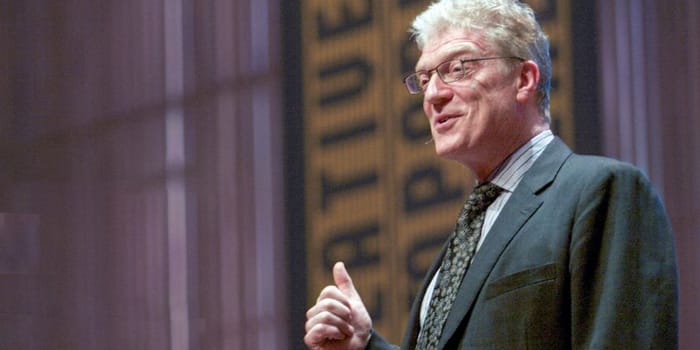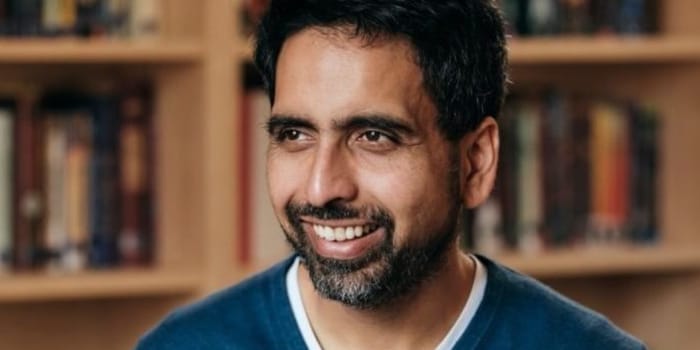Powerful Student Affirmations: Daily, Study & Test Success | College & Teens
Boost confidence and academic performance with powerful affirmations for students. Discover daily study affirmations for those seeking positivity & growth.

TED Talks are a valuable source of inspiration, innovation, and professional development, so we have compiled a list of 10 TED Talks that are a must-watch for every educator.
One man's voice who resonates powerfully in education, urging us to rethink how we approach teaching and learning was Sir Ken Robinson. The internationally acclaimed education expert, delivered a captivating TED Talk titled "How to Escape Education's Death Valley." With millions of views, his talk serves as a wake-up call, challenging traditional education systems and emphasizing the critical importance of nurturing creativity and innovation in schools.
Sir Ken Robinson describes the current education system as stifling creativity and neglecting students' talents and passions. Standardized testing, rigid curriculum frameworks, and a focus on conformity hinder individuality and creative thinking, perpetuating a culture of compliance instead of fostering the diverse skills needed for a changing world.
Robinson advocates for a paradigm shift that celebrates and nurtures students' creative capacities. He believes creativity is as vital as literacy, an essential skill for success in the 21st century. Schools can unleash students' imagination, curiosity, and problem-solving abilities by valuing diverse forms of intelligence and fostering a culture that promotes creativity.
Collaboration is a key element emphasized by Robinson. Education must equip students with the skills to work together, build meaningful relationships, and solve problems collectively. By fostering collaborative learning environments, schools prepare students for the complexities of the natural world, where innovation often thrives through collective effort.
Success in education should extend beyond academic achievement, according to Sir Ken Robinson. He urges a broader understanding of success that encompasses fulfilling individual passions and interests. By focusing on the holistic development of students—nurturing their artistic, athletic, and entrepreneurial talents—we can create a society of engaged, motivated, and fulfilled individuals.
Watch here.

In a world that often celebrates extroversion, Susan Cain's TED Talk offers a thought-provoking perspective on the strengths and value that introverted students bring to the table. With a focus on creating inclusive learning environments, she sheds light on introverts' unique needs and abilities and provides strategies for educators to support their development.
According to Susan Cain, introversion is a valuable personality trait characterized by a preference for solitude, reflection, and internal processing. It is not a flaw or weakness but rather a trait that can lead to strengths such as creativity, critical thinking, and deep analysis.
Introverted students excel in listening, observing, and thinking. Their thoughtful nature allows them to consider multiple perspectives and develop well-crafted ideas. Recognizing and appreciating these strengths can help educators create an environment that values their unique contributions.
To support introverted students, Susan Cain suggests strategies for educators:
a. Balanced Group Work: Incorporate a balance between group activities and individual work, allowing introverted students time for solitary reflection and independent projects.
b. Quiet Spaces: Designate quiet spaces where students can retreat for focused work or relaxation, providing a sanctuary to recharge and tap into their creativity.
c. Individualized Approaches: Recognize different learning styles and preferences, allowing introverted students to engage in ways that suit their needs. Offer alternative methods like writing, research projects, or presentations to smaller audiences where introverts can excel.
Susan Cain advocates valuing introversion as much as extroversion, creating a balanced and inclusive environment that celebrates diversity. This shift involves dispelling biases that favor extroverted traits and appreciating the depth and richness introverts bring to discussions, problem-solving, and creativity.
Watch here.

Another Sir Ken Robinson TED Talk that has made our top ten delivers a powerful and thought-provoking message that challenges the traditional education system's approach to nurturing creativity and imagination. With millions of views, Robinson's talk serves as a rallying cry for transforming education to foster the innate creative potential of students.
Sir Ken Robinson highlights how schools unintentionally stifle creativity by prioritizing certain subjects and promoting conformity and standardization. This dampens students' natural creativity and hinders their ability to innovate and think critically.
Robinson emphasizes that creativity extends beyond the arts and is vital for problem-solving, adaptability, and entrepreneurship. He argues that creativity should be as important as literacy in educational curricula.
Robinson advocates for nurturing divergent thinking, encouraging exploring multiple possibilities, and finding unique solutions. It helps students develop their own perspectives, ask questions, and take risks, fostering creativity and innovation.
Robinson highlights the importance of creating an environment where students feel comfortable making mistakes and taking risks. By embracing failures and adopting a growth mindset, students can learn from setbacks and develop resilience.
He also calls for a complete education system transformation to prioritize creativity and imagination. He suggests a personalized and holistic approach that values diverse talents, encourages collaboration and interdisciplinary learning, and integrates arts and sciences. This shift equips students with the innovative thinking needed for the future.
Watch here.

In this compelling TED Talk, Diana Laufenberg shines a light on embracing failure as a crucial component of the learning journey. Laufenberg challenges the prevailing notion that mistakes must be avoided and encourages educators to create an environment where students can take risks and learn from their missteps.
Laufenberg reframes failure as a valuable stepping stone for learning and growth. Instead of fearing mistakes, educators should view them as feedback mechanisms that guide students toward understanding and mastery. Embracing failure helps students develop resilience and adaptability.
She also emphasizes creating a safe environment where students can take risks and explore ideas without fear of judgment. By establishing trust and a growth mindset, educators empower students to learn from their mistakes and approach challenges confidently.
Laufenberg challenges the obsession with grades and standardized assessments, advocating for a focus on the learning process and critical thinking skills. Redirecting attention to the learning journey nurtures curiosity, motivation, and a passion for knowledge.
Reflection is key to learning from mistakes. Laufenberg highlights that educators deepen their understanding of the learning process and foster self-directed learning by providing opportunities for students to analyze failures, identify areas for improvement, and develop metacognitive skills.
Laufenberg highlights the importance of cultivating a growth mindset in educators and students. Embracing the belief that intelligence and abilities can be developed through effort and persistence, educators inspire students to approach challenges with optimism and view failure as a chance to learn and grow.
Watch here.
Christopher Emdin TED Talk urges educators to embrace creative and engaging teaching methods to foster meaningful connections with their students. Teachers can create a transformative learning experience that empowers and inspires by infusing their classrooms with enthusiasm and innovative techniques.
Emdin emphasizes authentic connections between teachers and students as the foundation for effective teaching and meaningful learning experiences. Building trust, empathy, and understanding creates an inclusive environment where students feel valued and empowered.
Recognizing students' diverse backgrounds is crucial for engagement. Infusing culturally relevant content allows students to see themselves reflected in the curriculum, fostering a sense of belonging and creating an inclusive learning environment.
Employing innovative teaching methods captivates students' interest and imagination. Using music, movement, storytelling, and other creative approaches brings lessons to life, enhancing comprehension and deepening the connection to the subject matter.
Empowering students involves listening, valuing their perspectives, and offering opportunities for active participation and co-creation of knowledge. When students feel heard, they become active participants in their learning journey, increasing motivation and understanding.
Emdin also suggests moving beyond traditional assessments centered on grades and standardized testing. Emphasizing authentic assessments that value students' progress, growth, and individual strengths foster a positive learning culture. Celebrating achievements reinforces the idea of learning as a lifelong journey.
Watch here.

In this TED Talk, Dan Pink challenges the traditional notions of motivation and delves into the science behind what truly drives engagement and performance in education.
Pink challenges the traditional approach to motivation, which relies on external rewards and punishments. He also argues that this approach needs to be revised for complex tasks requiring autonomy, mastery, and purpose.
Pink emphasizes the role of autonomy in fostering motivation. When students have control over their learning, they feel empowered to explore and take ownership of their education.
The desire for mastery is crucial for motivation. Pink suggests providing opportunities for skill development and meaningful challenges to nurture intrinsic motivation.
Pink highlights the importance of purpose in driving motivation. Connecting learning to real-world problems and students' passions ignites engagement and commitment.
While rewards work for simple tasks, Pink warns against relying on them for complex cognitive tasks. Extrinsic rewards can undermine intrinsic motivation, creativity, and performance. Fostering intrinsic motivation through autonomy, mastery, and purpose is key.
Watch here.

In her enlightening TED Talk, Kelly McGonigal challenges our conventional perception of stress and presents research demonstrating how changing our mindset can transform stress into a valuable tool for growth and resilience. While stress is often seen as an opposing force, especially in education, McGonigal urges us to embrace it and view it as an opportunity for personal and educational development.
McGonigal highlights the positive effects of stress on cognitive function, motivation, and learning. By perceiving stress as a natural response to challenges, educators can help students view it as a friend rather than a foe, fostering personal growth.
Stress can strengthen resilience when approached with the right mindset. Educators can teach students to see stress as a call to action, encouraging them to develop coping strategies and navigate difficult situations effectively.
Instead of trying to eliminate stress, McGonigal suggests that educators embrace it and teach students how to manage it. By incorporating stress management techniques into the curriculum, educators equip students with tools for improved performance and personal growth.
Creating a supportive learning environment is crucial for helping students navigate stress. McGonigal emphasizes the power of social connections and encourages educators to foster collaboration, empathy, and open communication. By providing resources and peer support, students can thrive despite challenging circumstances.
Watch here.

In this inspiring TED Talk, Rita Pierson highlights the significance of establishing meaningful relationships with students. She talks about the importance of advocacy, connection, and support in helping students thrive academically and personally.
Pierson encourages teachers to advocate for their students, going beyond imparting knowledge. By championing their well-being and fighting for their best interests, students feel valued, heard, and empowered, leading to increased engagement and academic achievement.
Creating a positive classroom culture is essential. Pierson highlights the importance of acceptance, inclusion, and celebration of diversity. By fostering encouragement and support, educators create an environment where students can take risks, ask questions, and learn from mistakes.
Pierson emphasizes the power of belief in every student's potential. Teachers' faith in their abilities positively impacts their motivation and achievement. Educators help students overcome challenges and reach their full potential by fostering a growth mindset and providing personalized support.
She also points out the need for teachers to connect with students personally. Educators can tailor their approach and make learning relevant and engaging by understanding their interests, backgrounds, and aspirations. When students feel seen, heard, and understood, they are motivated to participate in their education actively.
Watch here.
In his thought-provoking TED Talk, George Greenbury explores the future of education and highlights the transformative power of online learning in addressing global educational inequalities.
Online education revolutionizes learning by offering flexibility, customization, access to diverse subjects, and expert instructors. Learners can tailor their experiences based on their needs, interests, and pace, enriching their educational journey.
Greenbury suggests that interactive experiences are crucial to maximize online learning's potential. Incorporating virtual labs, simulations, and gamified assessments enhances student engagement and deepens understanding of the material.
Online education should prioritize building social connections and collaborative opportunities. Greenbury highlights the importance of discussion forums, group projects, and virtual classrooms, enabling learners to interact, exchange ideas, and foster community, motivation, and social-emotional development.
Educators play a vital role in online learning by guiding students, providing personalized support, and nurturing a love for learning. Therefore, maintaining the human element is essential, and teachers should receive proper training and support to navigate the online realm effectively.
Watch here.
Salman Khan unveils the revolutionary Khan Academy and its impact on the traditional education system. Throughout the talk, he delves into his vision, highlighting the creation of Khan Academy's structured educational videos, the effectiveness of interactive exercises, and the concept of flipping the classroom script.
Interactive exercises are fundamental to Khan Academy's approach. Students actively solve problems, receive immediate feedback, and reinforce their understanding. Through continuous practice and personalized feedback, students achieve more profound subject mastery.
Khan proposes flipping the traditional classroom model. Video lectures are assigned as homework, allowing classroom time for collaborative activities and personalized teacher assistance. Face-to-face interactions maximize engagement and guidance.
Khan Academy enables personalized learning, catering to individual needs and abilities. Students progress at their own pace, accessing diverse resources tailored to their requirements. Autonomy and mastery are fostered through personalized learning.
Teachers remain vital in Khan Academy's vision. They leverage the platform to provide individualized attention, address challenges, and nurture critical thinking. Teachers guide students through their learning journey, facilitating deeper understanding.
Watch here.

Boost confidence and academic performance with powerful affirmations for students. Discover daily study affirmations for those seeking positivity & growth.
Discover fun senior memory box ideas, what to put inside, and why these keepsakes matter. Celebrate your senior year with a personalized memory box!
Discover the interleaving study method: a research-backed technique to enhance learning efficiency and retention. Learn how to implement it for better results.
Explore the Quizgecko platform and create your first online quiz, test or assessment. No credit card required.